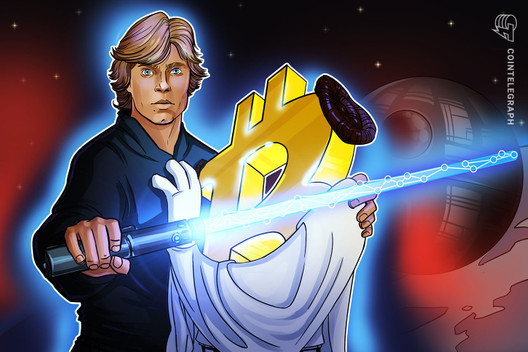Beyond Dogecoin: The 5 hottest cryptos on Twitter this month
In the realm of digital assets, Crypto Twitter is a major seat of power. Memecoins and serious large-cap assets alike can see their value rise or fall depending on whether the whimsical Twitter crowd decides to pay attention.
Huge rallies and dramatic declines often trigger waves of Fear, Uncertainty and Doubt (FUD) or Fear of Missing Out (FOMO) on the platform, capable of massively amplifying the unfolding price dynamics.
Granted, it would be convenient if increases in Twitter volume always spelled price hikes — yet, as the facts demonstrate, this relationship is way, way more complicated than that.
Tweet volume is one of the ingredients of a proprietary formula powering the VORTECS™ Score, a machine learning algorithm that compares historic and current market conditions around digital assets to aid crypto traders’ decision making. The model considers a host of other indicators – market outlook, price movement, social sentiment, trading activity – to arrive at a score that assesses whether the present conditions are historically bullish, neutral, or bearish for a given coin.
This week, we follow five digital assets who made the biggest strides in terms of Twitter activity this month. All five added hundreds of percent of tweets compared to the previous month’s average – but how actionable were these dynamics for traders?
Here’s how the VORTECS™ Score could give investors a few hints.
Telcoin (TEL): +300% Twitter volume
Between May 2 and 5, as Telcoin (TEL) was bracing for a massive price leap that would take it from below $0.01 to above $0.05 within ten days, two considerable spikes in tweets tagging TEL occurred. While the coin would normally get several hundred mentions a day, these two peaks each saw more than 3,000.

Combined with other factors, this pattern was recognized as historically favorable by the VORTECS™ model, which dished out a very high score of 91 (red circle in the graph). A tremendous price run followed less than a day later. Further tweet volume spikes this month followed price surges rather than preceded them.

Overall, in the last 30 days, Telcoin delivered 189% vs. USD and 345% vs. Bitcoin.
Polygon (MATIC): +240% Twitter volume
Twitter activity around MATIC and its price action entered a virtuous circle in May, with each leg of the price rally triggering a surge in chatter which, in turn, preceded a further round of the token’s appreciation.

Of course, there was much more to Polygon’s remarkable month, with a slew of positive real-world developments and trading activity spikes, but tweet volume appeared to be an essential feature of each VORTECS™ score peak (red circles in the chart).

MATIC’s monthly gains: 125% vs. USD and 248% vs. BTC.
iExec (RLC): +711% Twitter volume
iExec (RLC) emerged as the biggest winner in terms of added tweet volume this month, yet its price increase has been more modest: 60% against USD and 148% against Bitcoin.

In RLC’s case, as the charts illustrate, spikes in tweet volume were largely reactive and merely followed price action. The coin’s VORTECS™ score has been largely neutral ahead of the rally that started around May 9, suggesting that the combination of market conditions preceding it has not been frequently observed before.

Solana (SOL): +525% Twitter volume
Solana (SOL) saw its average tweet volume increase more than four times compared to the previous month, yet almost all corresponding price gains got wiped out by the end of May: -31.48% against USD and +6.06% against Bitcoin.

Tweet volume largely lagged behind the price movement, with one notable exception: An outsized jump from 5,000 to 20,000 tweets on May 17 that contributed to an 80+ VORTECS™ score and came some 36 hours before the coin reached its all-time high near $58 (red circles in both charts).

Ethereum Classic (ETC): +321% Twitter volume
While the reasons behind Ethereum Classic suddenly surging from $40 to $160 in the first week of May remain a mystery, we can be fairly certain that an explosion in the volume of Twitter conversation was not one of them: All the added tweets came in response to the price rally.

The VORTECS™ algorithm hadn’t sensed a historically favorable outlook, either, as the score mostly remained in the neutral zone.

ETC ended the month with +67.36% vs. USD +158.85% vs. Bitcoin.
An uptick in Twitter activity around a digital asset can mean a variety of things, depending on the configuration of other important market and social indicators. The VORTECS™ Score, exclusively available to Cointelegraph Markets Pro members, can contextualize tweet volume within a constellation of other market-moving metrics.
For those who prefer to leverage raw data, the absolute number of tweets and current vs. average tweet volume are readily available as separate metrics on the market intelligence platform.
Cointelegraph Markets Pro is available exclusively to members on a monthly basis at $99 per month, or annually with two free months included. It carries a 14-day money-back policy, to ensure that it fits the crypto trading and investing research needs of subscribers, and members can cancel anytime.
Cointelegraph is a publisher of financial information, not an investment adviser. We do not provide personalized or individualized investment advice. Cryptocurrencies are volatile investments and carry significant risk including the risk of permanent and total loss. Past performance is not indicative of future results. Figures and charts are correct at the time of writing or as otherwise specified. Live-tested strategies are not recommendations. Consult your financial advisor before making financial decisions. Full terms and conditions.









